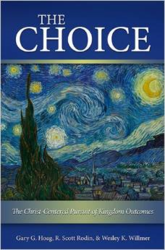 The Choice: The Christ Centered Pursuit of Kingdom Outcomes by Gary G. Hoag, R. Scott Rodin, Wesley K. Willmer (ECFA Press, 2014).
The Choice: The Christ Centered Pursuit of Kingdom Outcomes by Gary G. Hoag, R. Scott Rodin, Wesley K. Willmer (ECFA Press, 2014).
I stumbled across this book recently while searching for some other titles by Scott Rodin. Initially, I was put off by the management-speak jargon in the subtitle. I loathe management books. The reliance on trendy, made-up lingo, the insistence that everything is and should be quantified, and the reduction of all things to black-and-white, yes-or-no propositions (“You can do it!” “If you follow these three steps you will achieve…” “Successful organizations are those that adopt these five practices”)—all of it leaves a bad taste in my mouth, especially when I am told that those ideas are somehow “revolutionary” or “vital” for the ministry world. I feel like I am being force-fed something that doesn’t taste good and isn’t particularly nutritious.
But this book is a little bit different. It does have some of that jargon I find personally repellent, but it is a short and straightforward read with one profound insight at its core: so much of what we do in the name of ministry is driven by worldly rather than kingdom priorities. In many ways, this is an anti-management book. Describing our current predicament, the authors quote creator of VeggieTales Paul Vischer:
We’re drinking a cocktail that’s a mix of the Protestant work ethic, the American dream, and the gospel. And we’ve intertwined them so completely that we can’t tell them apart anymore. Our gospel has become a gospel of following your dreams and being good so God will make all your dreams come true… I realized I’m not supposed to be pursuing impact. I’m supposed to be pursuing God. And when I pursue God I will have exactly as much impact as He wants me to have.[1]
The Choice begins by briefly contrasting the “common,” or worldly, path of ministry leadership with what the authors have termed “the kingdom path.”
On [the kingdom path], success is defined in terms of our obedience to the instructions of Jesus Christ for which He promises eternal rewards. On the kingdom path, we as Christ-followers become less concerned about results that we cannot control because our primary concern is obedience. Our attention shifts from what we are doing for God to what God asks us to do and wants to accomplish in and through us. The former represents results we think we can generate taking the common path; the latter reflects the kingdom outcomes God produces through faithful followers.
How would we measure success along these lines? The kingdom path still assesses three ministry measures—people, facilities, and finances—but it does so in radically different ways. Each of these relate to individuals as well as congregations and organizations: (1) quantitative measurements that count clients or peoples served are superseded with qualitative measurements of our own faithfulness in meeting needs (How many? vs. How well?). (2) The focus on expansion of facilities shifts to considering our effectiveness in stewarding the resources we have (How do we build more? vs. What are we doing with what we have?). (3) The drive for financial growth and security that leads to hoarding under the guise of sustainability is supplanted by the desire to maintain a posture of dependence on God (How can we secure our present and our future? vs. Are we trusting God to provide for our current needs and for the future by putting to work what He provides?).[2]
The rest of the book closes with chapters on three temptations that draw Christian leaders into pursuing “the common path” (control, idolatry, and pride) and a list of the “ten marks of Christ-centered ministry.” The numbering reminds the reader that this is still a book on management, but the points all serve to flesh out the content of the above two paragraphs.
Given all I dislike about management theory, why am I devoting a post to this book? Because those two paragraphs ring true. Time and again I have had discussions with leaders of organizations all across China that—all in the interest of facing “reality”—have centered on the first question in each of those three italicized dyads, while paying little attention to the second. Perhaps, precisely because of the threatening nature of our present “reality,” we would all benefit from examining our work in light of those second questions, and prioritizing obedience over results.
What changes would such a shift mean for your life and ministry in China?
PS—For those who are interested in the reverse side of this topic—in how ministries can shape those inside of companies rather than how companies have reshaped ministry—I heartily recommend the resources available through Mark Greene’s London Institute for Contemporary Christianity (originally founded by John Stott).
Image credit: Red and reading by Andrew Hefter via Flickr.
Swells in the Middle Kingdom
"Swells in the Middle Kingdom" began his life in China as a student back in 1990 and still, to this day, is fascinated by the challenges and blessings of living and working in China.View Full Bio
Are you enjoying a cup of good coffee or fragrant tea while reading the latest ChinaSource post? Consider donating the cost of that “cuppa” to support our content so we can continue to serve you with the latest on Christianity in China.